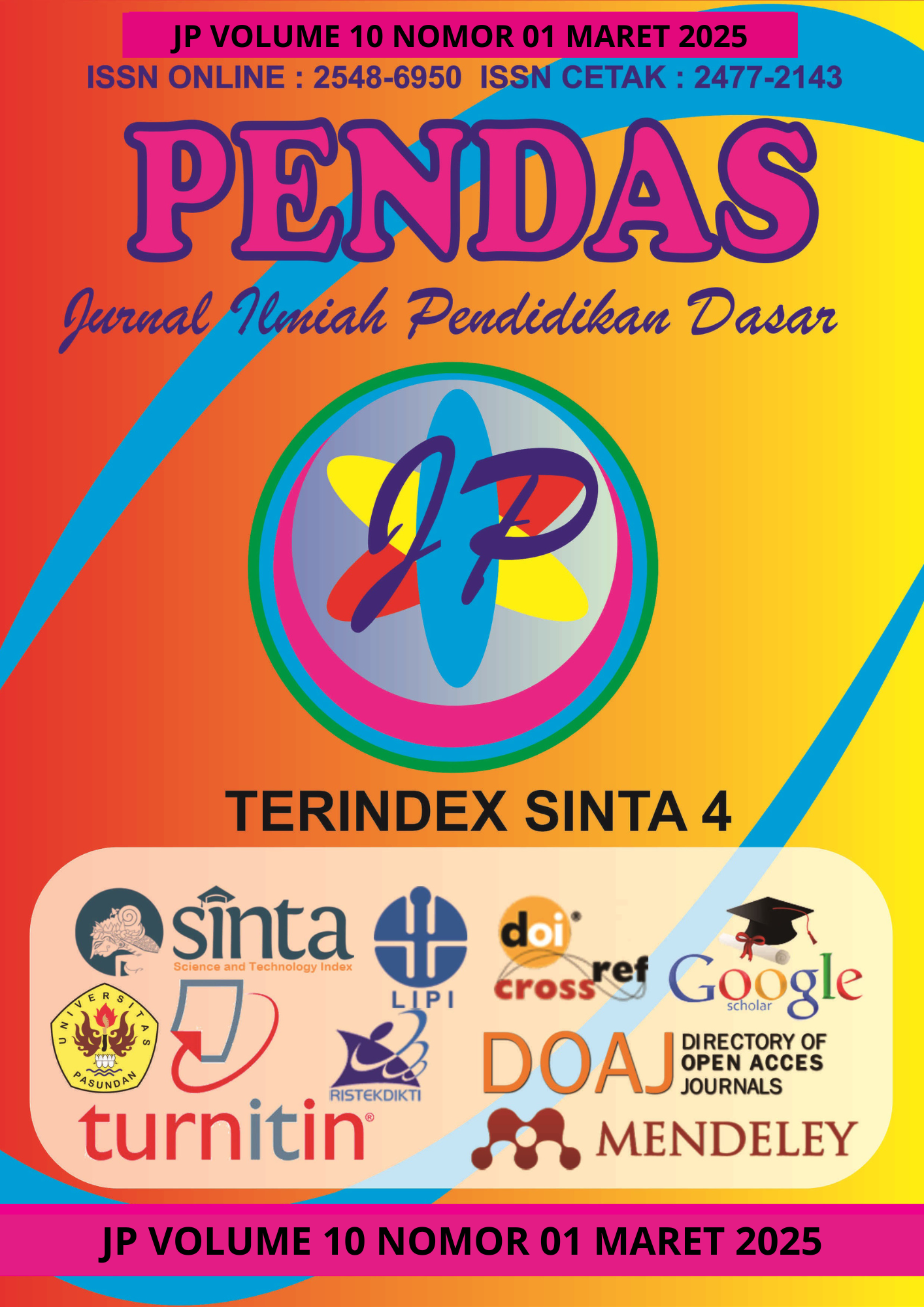KEEFEKTIFAN E-MODUL IPAS BERBASIS PROBLEM BASED LEARNING DALAM MENINGKATKAN LITERASI SAINS SISWA SEKOLAH DASAR
DOI:
https://doi.org/10.23969/jp.v10i01.22153Keywords:
e-module, PBL, science literacy, science, elementary school studentsAbstract
The Effectiveness of Problem Based Learning-Based Science E-Modules in Improving Elementary School Students' Science Literacy is a study that aims to determine the effectiveness of using Problem Based Learning (PBL)-based e-modules in improving science literacy in Elementary School (SD) students in the subject of Natural and Social Sciences (IPAS). This study uses a quasi-experimental research design with a pre-test and post-test approach in two groups, namely the experimental group using PBL-based Science e-modules and the kontrol group using conventional learning methods. The subjects of the study consisted of fifth grade students of Kedungsukun 01 Elementary School, Adiwerna District, Tegal Regency. Data were collected through science literacy tests given before and after the implementation of learning, as well as observations and interviews to explore students' responses to the use of e-modules. The results of the data analysis showed that there was a significant increase in the science literacy of students using PBL-based e-modules, compared to the kontrol group. In addition, the results of the interviews showed that students were more interested and involved in PBL-based learning, which encouraged students to think critically and solve problems both independently and in groups. Based on these findings, it can be concluded that the use of PBL-based science e-modules is effective in improving elementary school students' science literacy. This study is expected to contribute to the development of more innovative and interactive science learning at the elementary school level.
Downloads
References
Hajar, S., & Fitria, Y. (2022). Efektifitas Penggunaan Modul Digital Berbasis Model PBL terhadap Penguasaan Konsep IPA Tematik di Sekolah Dasar. Jurnal Basicedu, 6(3), 4480–4488. https://doi.org/10.31004/basicedu.v6i3.2808
Kaniyah, Y., Purnamasari, I., & Siswanto, J. (2022). Pengembangan E-Modul Pembelajaran IPA berbasis Problem Based Learning untuk Meningkatkan Kemampuan Literasi Sains Peserta Didik. Jurnal Kualita Pendidikan, 3(2), 2774–2156.
Karmila, M., & Abidin, Z. (2023). Pengembangan E-Modul Berbasis PBL dengan Media Wepik Terhadap Peningkatan Kemampuan Literasi Sains dan Numerasi Siswa MA. Jurnal Ilmiah Wahana Pendidikan, 9(22), 611–626. https://doi.org/10.5281/zenodo.10129984
Kimianti, F., & Prasetyo, Z. K. (2019). Pengembangan E-Modul IPA Berbasis Problem Based Learning untuk Meningkatkan Literasi Sains Siswa. Kwangsan: Jurnal Teknologi Pendidikan, 7(2), 91. https://doi.org/10.31800/jtp.kw.v7n2.p91--103
Mahendra, M. R., Enawaty, E., Junanto, T., Muharini, R., & Lestari, I. (2023). Efektivitas Penggunaan E-Modul Kimia Dasar Berbasis Problem Based Learning dalam Meningkatkan Kemampuan Memecahkan Masalah Mahasiswa pada Materi Termokimia. Journal of The Indonesian Society of Integrated Chemistry, 15(2), 120–127. https://doi.org/10.22437/jisic.v15i2.27826
Naimi, N., Azizah, A., Pendit, S. S. D., Zunaedi, K. R., Isman, Mhd., & Sitepu, M. S. (2023). Efektivitas E-Modul Dilan Berbasis Android (DIDROID) Terhadap Hasil Belajar IPA Siswa Sekolah Dasar. Jurnal Paedagogy, 10(2), 536. https://doi.org/10.33394/jp.v10i2.7281
Permana*, I., Zulhijatiningsih, Z., & Kurniasih, S. (2021). Efektivitas E-Modul Sistem Pencernaan Berbasis Problem Solving Terhadap Kemampuan Pemecahan Masalah. Jurnal IPA & Pembelajaran IPA, 5(1), 36–47. https://doi.org/10.24815/jipi.v5i1.18372
Prihastuti, E., Prodi, S., Biologi, P., Semarang, N., & Sekaran, J. R. (n.d.). Efektivitas Pengembangan E-Modul Interaktif Berbasis Project Based Learning Materi Sistem Ekskresi Manusia untuk Meningkatkan Literasi Sains Siswa SMA.
Rahmawati, Y. (2023a). Efektifitas Penggunaan E-Modul Berbasis Project Based Learning Terhadap Kompetensi Peserta Didik Pada Kurikulum Merdeka Belajar. 4, 293–300. http://jurnaledukasia.org
Rahmawati, Y. (2023b). Efektifitas Penggunaan E-Modul Berbasis Project Based Learning Terhadap Kompetensi Peserta Didik Pada Kurikulum Merdeka Belajar. 4, 293–300. http://jurnaledukasia.org
Safitri, D., & Sari, P. M. (2023). Pengembangan E-Modul Berbasis Kemampuan Literasi Sains pada Pembelajaran IPA bagi Siswa Kelas V Sekolah Dasar. Al-Madrasah: Jurnal Pendidikan Madrasah Ibtidaiyah, 7(4), 1571. https://doi.org/10.35931/am.v7i4.2585
Seminar, P., Penelitian, N., & Pengabdian, D. (2021). Penelitian dan Pengabdian Inovatif pada Masa Pandemi Covid-19.
Supratman, S., Noviat, W., & Hidayanti, N. (n.d.). Efektivitas E-Modul Berbasis Problem Based Learningterhadapliterasi Sains. Jurnal Ilmiah Wahana Pendidikan, Februari, 2023(3), 623–631. https://doi.org/10.5281/zenodo.7635614
Systematic Literature Review: Pengembangan E-Modul IPA Berbasis Problem Based Learning Untuk Meningkatkan Literasi Sains Siswa. (n.d.). http://prosiding.unipma.ac.id/index.php/SENASSDRA
Downloads
Published
Issue
Section
License
Copyright (c) 2025 Pendas : Jurnal Ilmiah Pendidikan Dasar

This work is licensed under a Creative Commons Attribution 4.0 International License.














































